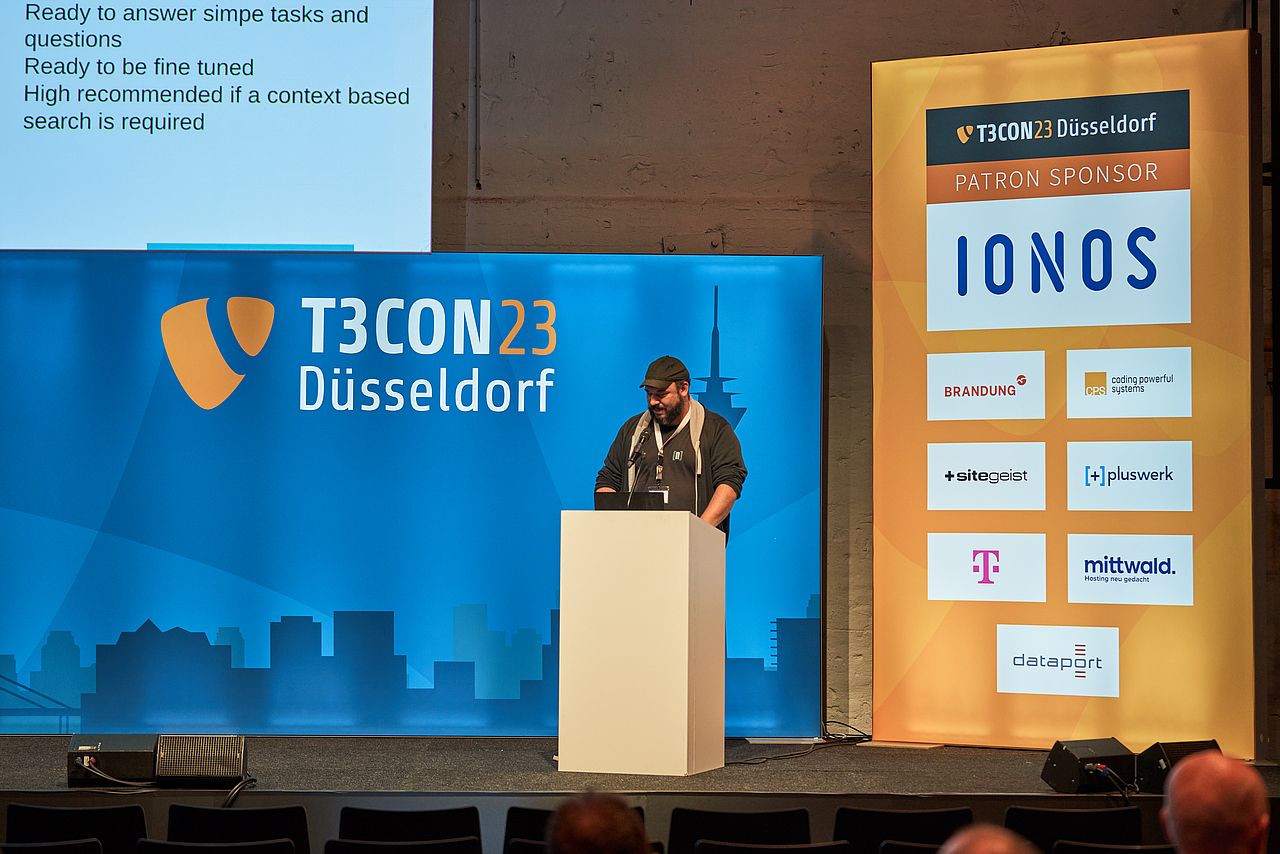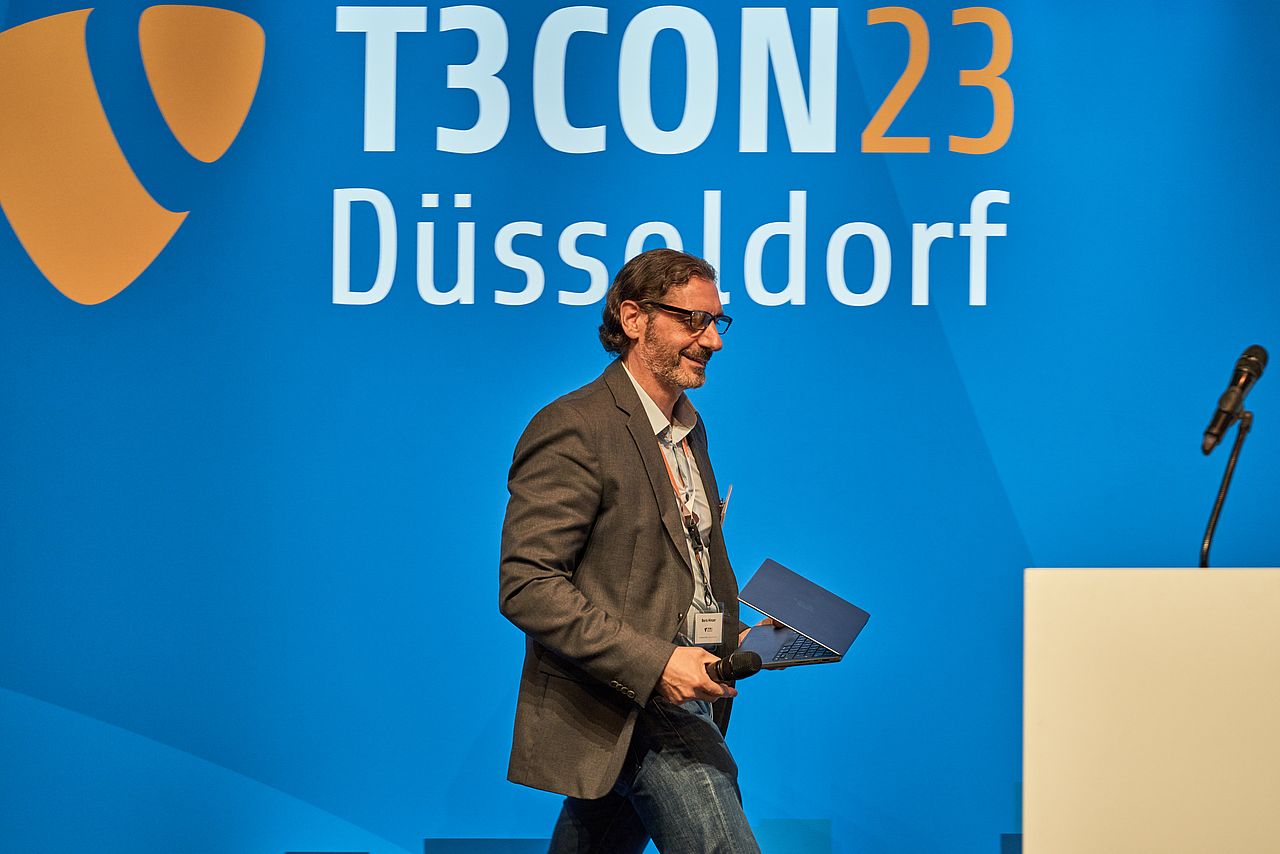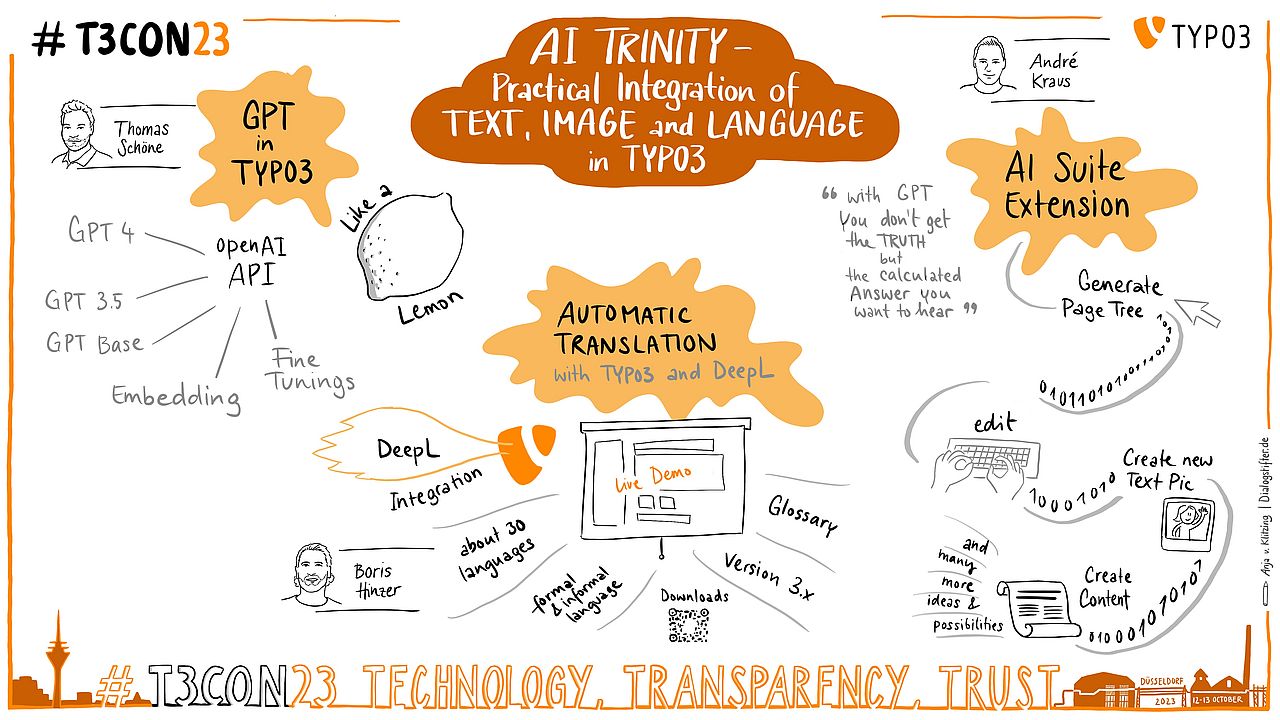
T3CON Recap—TYPO3 CMS & AI: Three Snapshots of AI-Powered Content Management
AI-generated text and images are not the only way to improve your content management experience. Automated page structures, advanced translation workflows, and AI-supported search are new possibilities now integrated directly into TYPO3 CMS.
T3CON23 demonstrated that TYPO3 is where innovative AI meets exceptional content management, featuring three presentations on the potential of these new integrations::
- Thomas Schöne from Netresearch talked about Innovative Content Creation with a TYPO3 AI Writer.
- Boris Hinzer from web-vision presented Accurate and Nuanced Machine Translation with DeepL Translate.
- André Kraus from GMK Bayreuth demonstrated Automated Routine Tasks with the TYPO3 AI Suite.
Read on for a full recap of the AI Trinity – Practical Integration of Text, Image, and Language in TYPO3 session, or catch up on what else you missed at T3CON23.
Innovative content creation with a TYPO3 AI Writer
“Six months ago, we created the TYPO3 extension t3_cowriter,” said Thomas Schöne, a developer at TYPO3 agency Netresearch. With this tool, editors can use GPT-4 to assist their content creation within TYPO3 — and the code is freely available on GitHub.
The TYPO3 extension extends the CMS’s built-in rich text editor, so you can insert text generated by GPT-4 into any rich-text field. Schöne demonstrated how a button in the toolbar opens a dialog box where you enter your prompt to the AI, with the generated text going straight where you want it.

Improved sorting and better search results with OpenAI’s API
These are simple beginnings, but Schöne explained that Netresearch has great plans for their extension and gave two examples of future possibilities for AI support within TYPO3:
- Relevance weighting and sorting with Embeddings. This feature of OpenAI’s API allows you to measure the relatedness of texts, giving a better way to prioritize the most relevant content in a certain context. This can be used for search results, autocomplete suggestions, and lists of related news.
- Improved search results from vague queries. “The current search functionalities in TYPO3, such as Solr or Indexed Search, are all essentially based on matching words. OpenAI goes one step further and can know what words mean,” Schöne explained. He gave an example from a botanical website: “The words yellow and sour may never appear in content about lemons. This means that conventional searches for ‘yellow, sour fruit’ will fail. The AI model knows that this means lemon and can deliver the corresponding search results.”
With powerful APIs available, AI-based functionality in TYPO3 appears to have a bright future. Schöne said the initial feedback from clients has been very positive, and he praised the simplicity of the setup process: “The extension is installed, the OpenAI API key is saved, and everything is ready. Editors have a button in their familiar editing interface, and a text takes seconds to generate.”
Accurate and nuanced machine translation with DeepL Translate
Next, Boris Hinzer went on stage to demonstrate seamless translation workflows in TYPO3 using the neural machine translation service DeepL. Boris is the CEO of web-vision, a German TYPO3 agency that has implemented DeepL’s functionality into the popular extension DeepL Translate. “It has over 55,000 downloads so far,” he boasted.
He explained that DeepL “really provides high-quality translation, so you don’t necessarily need to have a native speaker check it. […] Out of the box, it supports 29 source languages and 31 target languages.”
DeepL recently started supporting language varieties like British and American English. “It also supports formal or informal language, like we use here in Germany,” he said.
A close integration with TYPO3
Boris logged in to TYPO3 and demonstrated how the extension functions in practice. “We are going to translate from American English to German,” he said, but underscored that you can translate into any available language. “If you already have other languages with content in there, you can preselect them and translate, for instance, from Danish to German, or from American English to French.”
The extension integrates closely with both TYPO3 and DeepL. “Once a new language becomes available in the DeepL API, it's immediately there. You don’t need to do anything.” He explained how Ukrainian was introduced as a new language about a year ago. Translation became available immediately within TYPO3, so “you can choose the source language and then it will translate it to Ukrainian

Versatile and integrated with TYPO3’s translation workflows
“It works with page content, it works with content elements, and it works with data records,” Boris said. This means you can translate not only page content, but also content within third-party extensions. “For instance, if you have tx_news installed.”
An important challenge for many, following the initial translation, is how to maintain translated content. Thankfully, TYPO3 already supports advanced translation workflows and will keep track of changes in the original language. The DeepL Translate extension follows suit by tracking both a translation’s age and verification status.
“We record the translation date, which is saved in the page properties,” Boris said. Additionally, there is a verification check box, “so you can check it to say, ‘Okay, this content was verified by a human being.’” This means, for example, that you can label text in the frontend to indicate that “this was completely automatically translated without any review,” while allowing visitors to suggest improvements to the translation.
Invoicing service removes the need for a credit card
The DeepL Translate extension is available on the TYPO3 Extension Repository (TER) and GitHub for TYPO3 versions 9, 10, and 11. Boris explained that “we have a new version supporting TYPO3 version 12, which is available in an early-access program right now. It’s a working version. It’s fully supported. But you need to sign up with us first.”
Boris explained that the extension is popular among universities, but that getting hold of a DeepL API key can be difficult within these large organizations. “Not every university was able to come up with the credit card to sign up for it,” he said. “So we made a little service where they can get the DeepL API key from us. We send invoices to them, so that they can pay.”
Glossary and automatic translation support
Boris also talked about the issue of translating websites that use special terms and phrases. “We built in a glossary feature […] supporting 11 different languages and 55 language pairs.” If your language is supported, “you can really do some nice stuff.”
In his example, he added a glossary entry for ice cream, telling DeepL to always translate it into German as Erdbeereis (which actually means strawberry ice cream). Likewise, the abbreviation GSB can be expanded into Government Site Builder TYPO3, using the same functionality.
These glossaries are easy to maintain: “You can either sync the glossary manually, like I did here, or you can have a Scheduler task doing it for you, minute by minute. And then you can translate […] technical terms and phrases, for lawyers, for the public sector, for universities.”
Web-vision is also developing a similar extension for the eCommerce solution Magento. Currently, this extension is slightly ahead of its TYPO3 sibling and supports automatic translation of new products. Similar functionality is on its way to TYPO3 as well.
Automated routine tasks with the TYPO3 AI Suite
André Kraus, a freelancer and part-time employee at German TYPO3 agency GMK Bayreuth, presented a work-in-progress. “I'm working with a colleague, who is also a freelancer and part-time-employed, called Manuel Schnabel, to implement the power of AI into TYPO3,” he said.
André and Manuel can imagine many ways to add AI automation to TYPO3’s pages and content. One example is translation, like web-vision’s DeepL Translation extension. However, their extension took AI integration one step further.

Creating a page tree with GPT-4
The first thing André showed was automatically creating a page tree using AI. “We can say: ‘Create the page structure for the website of an SEO agency.’” GPT-4 returned an example structure that could be edited and reordered before being inserted into TYPO3.
“The next thing we could want to do is SEO metadata and optimization — but first we need content,” André said, and requested a Text and Image content element for one of the pages in the generated page structure from the AI. Text was generated by GPT-4 and image suggestions were brought in from the DALL-E AI image generator, and André selected one, before instructing the extension to add the content to the page.
A DALL-E image generator in your content element
At a demo at TYPO3 Camp Munich, André was told, “We need that button right inside our content element.” So with Manuel he added a “Generate image with AI button where you can […] create a new image within the content element.”
The two developers have many ideas for the future, such as improving existing content. “Maybe you want to import things from a WordPress homepage? This could be done automatically,” André envisioned. “Last, but not least, we are thinking about auto-scheduling and automatic posting of news.”
What’s next in TYPO3 AI?
T3CON23 left us excited about what’s possible — but also looking forward to hearing what next year brings.
T3CON24 will take place in Düsseldorf, Germany, 26–28 november 2024. You can start warming up already now, by reading more of the 2023 recaps.



